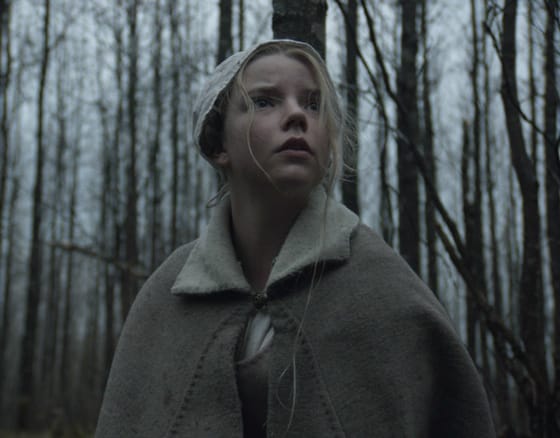Tellingly subtitled "A New England Folktale," this graceful, hauntingly stylish psychological thriller is thoroughly permeated with the fervid religious paranoia animating and agitating 17th-century colonialists unable to intellectually reconcile their religious beliefs with the chilling impotence of man against the merciless, unfathomable puissance of Mother Nature.
Exiled from a plantation village, a man, his wife and their five children set up a homestead of their own in complete isolation. The situation is far from idyllic in the best of circumstances, but when a tragedy befalls the family, the ominous woods surrounding them take on a more sinister cast, suggesting to minds made malleable by myth-taken-as-fact that a malicious supernatural force may be to blame.
Taking cues from the insidious creeping tension of thoughtful horror like Polanski's Rosemary's Baby, Eggers does a tremendous job of making the commonplace feel otherworldly and menacing, effectively portraying the inner mindset of a people convinced that the devil is always lurking, seeking any opening in which to infect the innocent. The young director also very effectively sets up dual readings of the film with a strong subtext that isn't subtle but is easy to ignore for viewers that would prefer to interpret the events as purely supernatural.
To simply experience the visceral thrills and masterfully wrought tension of The Witch would be a disservice to how well Eggers plays with the symbolic psychological shields these characters use to deflect blame for pretty much everything, especially the sort of discomfiting urges that would arise with isolated children approaching maturity; it's certainly not incidental to the film's intent that Thomasin (Anya Taylor-Joy), the story's protagonist, is on the cusp of womanhood.
Equally effective as high-brow horror and as a thoughtful look at how religion demonizes sexuality (especially of the female sort), The Witch is an assured debut from a promising talent that will leave an imprint of terror on your psyche in the shape of a wet goat nose.
(Elevation Pictures)Exiled from a plantation village, a man, his wife and their five children set up a homestead of their own in complete isolation. The situation is far from idyllic in the best of circumstances, but when a tragedy befalls the family, the ominous woods surrounding them take on a more sinister cast, suggesting to minds made malleable by myth-taken-as-fact that a malicious supernatural force may be to blame.
Taking cues from the insidious creeping tension of thoughtful horror like Polanski's Rosemary's Baby, Eggers does a tremendous job of making the commonplace feel otherworldly and menacing, effectively portraying the inner mindset of a people convinced that the devil is always lurking, seeking any opening in which to infect the innocent. The young director also very effectively sets up dual readings of the film with a strong subtext that isn't subtle but is easy to ignore for viewers that would prefer to interpret the events as purely supernatural.
To simply experience the visceral thrills and masterfully wrought tension of The Witch would be a disservice to how well Eggers plays with the symbolic psychological shields these characters use to deflect blame for pretty much everything, especially the sort of discomfiting urges that would arise with isolated children approaching maturity; it's certainly not incidental to the film's intent that Thomasin (Anya Taylor-Joy), the story's protagonist, is on the cusp of womanhood.
Equally effective as high-brow horror and as a thoughtful look at how religion demonizes sexuality (especially of the female sort), The Witch is an assured debut from a promising talent that will leave an imprint of terror on your psyche in the shape of a wet goat nose.




